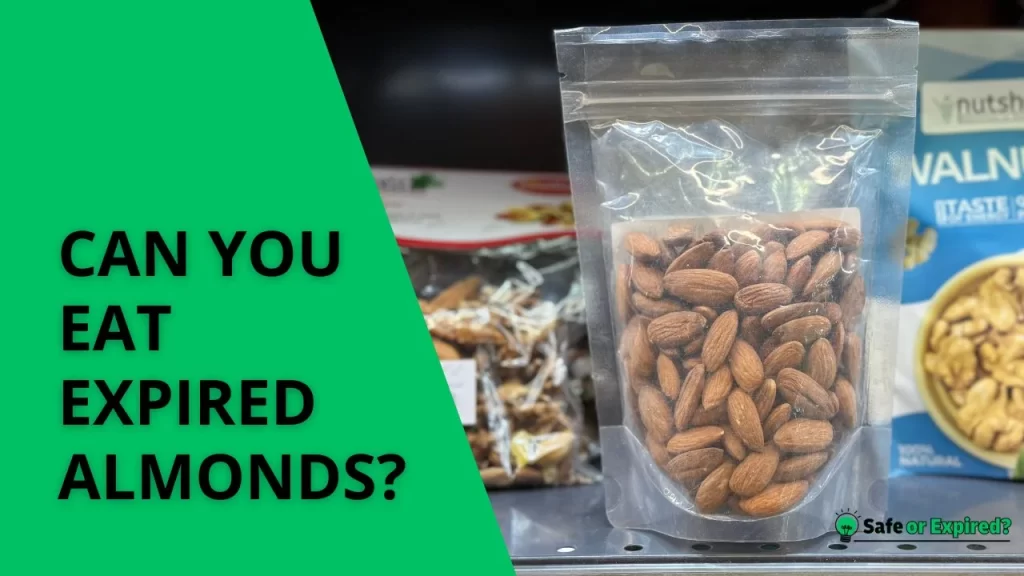“Can you eat expired almonds?” query might cross your mind as you uncover a forgotten bag of almonds stashed in your kitchen. Yes, you can eat them, but there are a lot of considerations you should make first. Worry not, as you will learn everything about eating expired almonds here. Continue reading.
Can You Eat Expired Almonds? (Everything to Know)
Yes, you can eat expired almonds if they are correctly stored and show no signs of spoilage. Almonds have a long shelf life and can remain safe to consume past their expiration date, provided they do not smell rancid, have mold, or their taste has not significantly altered.
Different forms of almonds, such as whole, sliced, or blanched, have varying shelf lives. Whole almonds, with their protective shell, tend to last the longest. Can you eat expired almonds raw? Yes, raw almonds can be eaten past their expiration date if they’re stored in a cool, dry place and show no signs of spoilage. A cupboard is an ideal place.
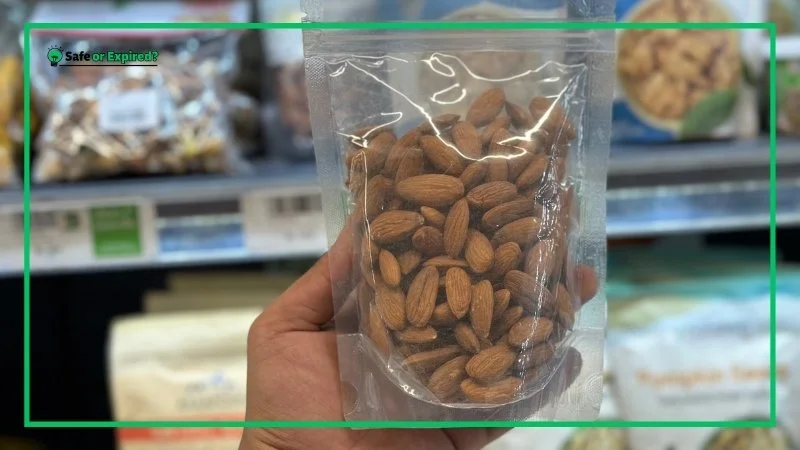
However, processed forms like almond milk or almond flour may have a shorter shelf life and should be consumed more cautiously. Remember to always check for these indicators before consuming.
What Happens if You Eat Bad Almonds? (The Details)
Eating bad almonds can lead to digestive discomfort, such as stomach cramps, due to potential bacteria or mold. Bad almonds might also have an unpleasant taste due to rancidity, which results from the oxidation of fats. It’s essential to inspect almonds for signs of spoilage before consuming them.
Mild to Severe Digestive Issues
When almonds spoil, they can develop harmful bacteria and fungi, leading to food poisoning. Symptoms might include nausea, vomiting, stomach cramps, and diarrhea. For example, a study published in the Journal of Food Protection highlighted that spoiled nuts could harbor Salmonella, a bacteria known for causing serious digestive disturbances.
Development of Rancid Flavors
Bad almonds often taste bitter or sour due to the oxidation of their fats. This doesn’t just make them unpleasant to eat; it also means you’re missing out on fresh almonds’ nutty, slightly sweet flavor. The rancid taste clearly indicates that the almonds are no longer suitable for consumption.
Potential Allergic Reactions
For some people, eating spoiled almonds can exacerbate or trigger allergic reactions. While not directly caused by spoilage, the changes in the almond’s composition might increase sensitivity in individuals with nut allergies, leading to symptoms like itching, swelling, or difficulty breathing.
Nutritional Loss
Almonds are prized for their nutritional benefits, including high vitamin E, magnesium, and healthy fats. However, when almonds go bad, these nutrients begin to degrade. This means you’re not getting the full health benefits you would from fresh almonds, reducing their overall dietary value.
What Are the Signs of Bad Almonds? (Complete Details)
Signs of bad almonds include a sour or rancid smell, a bitter or chemical taste, and visual changes like mold or discoloration. If almonds feel unusually hard or mushy, it indicates they’ve gone bad. It’s best to discard almonds showing any of these signs to ensure food safety.
Visual Changes: Spotting the Spoilage
One of the first indicators that almonds have gone bad is visual changes. Fresh almonds have a smooth, uniform color. If you notice any mold, which typically appears as white or green fuzzy spots, or if the almonds have developed dark or discolored patches, it’s a clear sign they’re past their prime.
Mold growth on almonds not only makes them unsafe to eat but can also indicate the presence of mycotoxins, harmful substances produced by fungi.
The Smell Test: Detecting Rancidity
Almonds contain oils that can become rancid over time, especially when exposed to heat, light, or air for extended periods. Rancid almonds have a sharp, bitter, and unpleasant smell, quite different from the nutty, slightly sweet aroma of fresh almonds. Trust your nose – if the almonds smell off or remind you of used cooking oil, it’s best to discard them.
According to the Journal of Food Science article, rancidity affects the taste and also diminishes the nutritional value, as the oxidation of fats destroys antioxidants like vitamin E.
Taste Test: The Ultimate Verdict
If almonds pass the visual and smell tests but you’re still unsure, tasting a small piece can help. Bad almonds often taste bitter or sour, significantly different from their naturally mild, slightly sweet flavor. However, taste testing should be the last resort due to potential health risks from consuming spoiled food. If you detect any unpleasant flavors, it’s safer to throw them away.
Texture Tells a Tale
Fresh almonds are firm and crisp. If your almonds feel soft, mushy, or unusually hard, it could indicate they’ve absorbed moisture or dried out, leading to potential mold growth or rancidity. The change in texture affects the eating experience and suggests that almonds may not be safe to eat.
Here’s what good-quality almonds should look like:
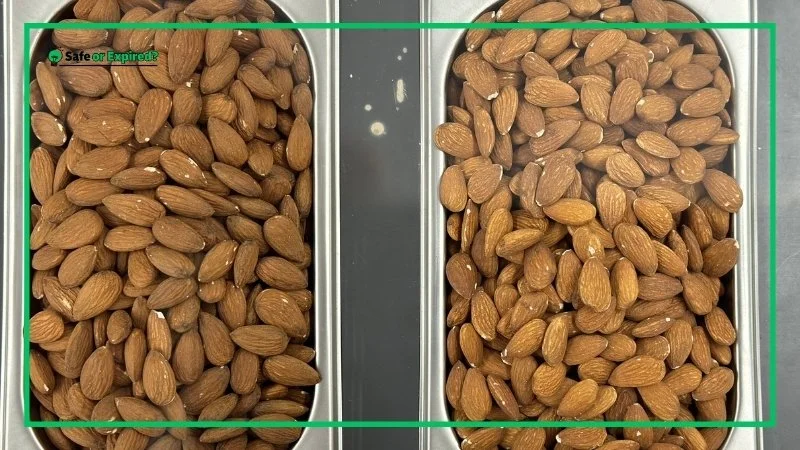
How Long Do Almonds Last? (Cut-off Time)
Almonds can last up to 2 years if stored properly. Unopened, they remain fresh in the pantry for about two years, in the fridge for up to 4 years, and in the freezer indefinitely. Once opened, their shelf life decreases but can still last for several months with proper storage.
How Long Do Almonds Last at Room Temperature?
At room temperature, unopened almonds can last up to two years when stored in a dry spot (which must be away from direct sunlight). This environment minimizes exposure to conditions that can speed up degradation, such as moisture and heat.
How Long Do Almonds Last Once Opened?
Once opened, almonds can last about 6 to 9 months at room temperature. To extend their freshness, ensure the almonds are kept in an airtight container, as we don’t want moisture to accelerate spoilage. If you don’t have the container, you can use any packaging (make sure no contaminants enter through it).
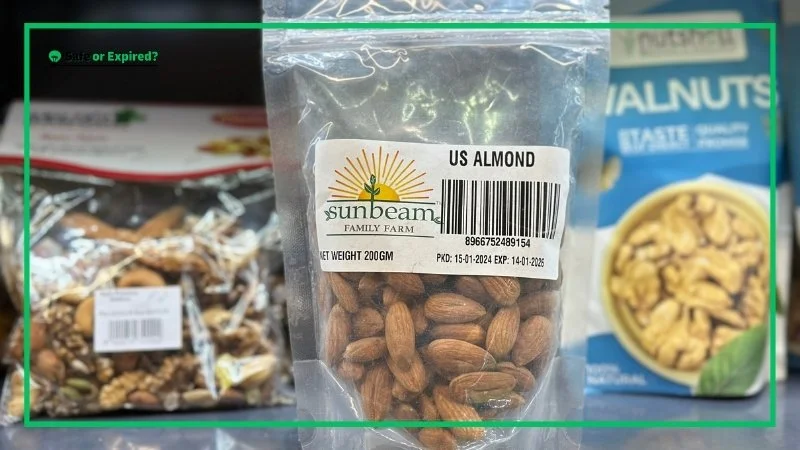
People also ask, “Do Almonds Go Bad After Opening?”
Yes, almonds can go bad after opening due to exposure to air, moisture, and other environmental factors that promote rancidity and spoilage. To maximize their shelf life post-opening, store almonds in an airtight container or refrigerate them.
Do Unopened Almonds Go Bad?
Unopened almonds do have a long shelf life but can eventually go bad due to natural oils turning rancid over time. Proper storage conditions can significantly extend their usability beyond the “best by” date, often up to 2 years at room temperature. However, it’s better to eat almonds before the expiration date printed on the package.
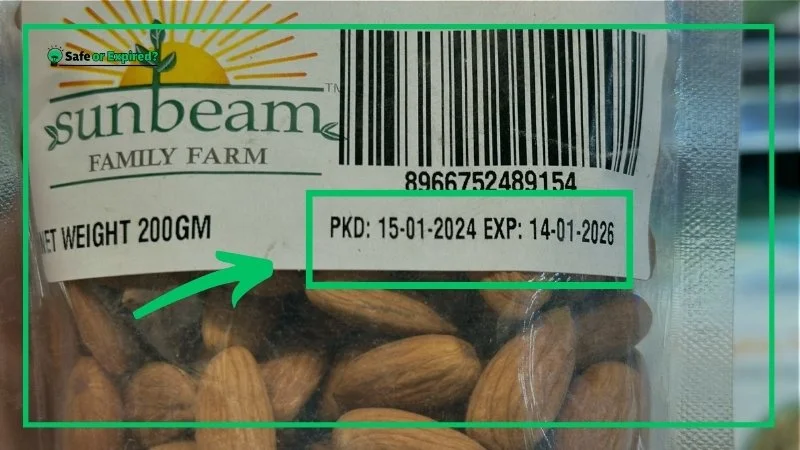
How Long Do Almonds Last After Expiration Date?
Almonds can last beyond their expiration date if stored correctly. Typically, they remain safe to eat and retain their quality for 6 to 12 months after expiration when kept at room temperature in a cool, dry spot.
If refrigerated, they can last an additional year, and when frozen, almonds can extend their freshness for up to 2 years past their expiration date. However, it’s crucial to inspect the almonds for any signs of spoilage, such as mold, off smells, or an unusual taste before consuming them.
Here’s a complete table detailing the shelf life of almonds based on their storage conditions:
| Storage Location | Opened Almonds | Unopened Almonds |
| Counter | 6 to 9 months | Up to 2 years |
| Fridge | 1 year | Up to 4 years |
| Freezer | 2 years | Indefinitely |
But almonds aren’t the only snack in our cupboards that might last longer than we think.
Just like almonds, there’s another favorite snack that might surprise you with how long it can last: popcorn kernels. Ever wonder if those popcorn kernels that have been in your pantry for a while are still good for a movie night? If you’re curious about popcorn and whether those old kernels can still pop up into something tasty, you’ve got to read “Do Popcorn Kernels Expire? Can You Eat Expired Ones?”
Conclusion
Almonds don’t last forever, so you must know whether you can eat expired ones or not. Here’s a quick recap:
- You can eat expired almonds if they don’t show signs of spoilage.
- Nutritional value diminishes over time, so fresher almonds are always better.
- Signs of spoilage include mold, a rotten smell, and a bitter taste; these almonds should be thrown out.
- Proper storage is key: Keep unopened almonds in the pantry and opened ones in an airtight container in the fridge.
- Inspect almonds before consumption to ensure they haven’t gone bad.
Remember, when in doubt about the freshness of your almonds, it’s best to err on the side of caution and dispose of any that show signs of spoilage. Now, you can safely enjoy almonds and make the most out of their shelf life.

